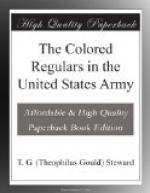(Sd) WM. R. SHAFTER,
Major-General, U.S.
Volunteers.
M.D. CRONIN,
A true copy:
First Lieutenant and Adjutant 25th Infantry.
To this very brilliant official record it is necessary to add but a word personal. Colonel Daggett is a typical New Englander; tall, well-formed, nervous and sinewy, a centre of energy, making himself felt wherever he may be. Precise and forceful of speech, correct and sincere in manners, a safe counsellor and a loyal friend, his character approaches the ideal. Stern and commanding as an officer he is nevertheless tender and sympathetic. His very sensitiveness concerning the feelings of others embarrasses him in giving expression to his own feelings on seeing suffering, unless it should be urgent, but those who know him best know him to be just, humane and tender. No man could have taken more care than he did for his regiment in Cuba. Hating oppression and wrong with a vehemency suited to his intense nature, he nevertheless deplores war and bloodshed. The President of the United States never did a more worthy act than when he gave to Lieutenant-Colonel A.S. Daggett of the Twenty-fifth Infantry his commission as Brigadier-General of Volunteers in recognition of his valor and skill at El Caney and of his general efficiency as an officer in our army.
TESTIMONIES CONCERNING THE WORK OF THE TWENTY-FIFTH INFANTRY BEFORE EL CANEY.
Headquarters First District,
Southern Luzon,
El Deposito, P.I., April
20, 1900.
My Dear General Daggett:—Some time ago I received a letter from you asking me to make an official statement as to where and at what objective the energies and fire of the 25th Infantry were directed during the battle of El Caney, Cuba, July 1, 1898.
In reply I have the honor to officially state that about noon July 1, 1898, the regiment moved from the mango grove, near the Ducro House, toward a stone fort located on a hill, near the town of El Caney.
It arrived at about one of the afternoon at a point about eight hundred yards to the south and east of the fort; immediately deployed, and the First Battalion, under command of Captain Walter S. Scott, and of which I was adjutant, designated as the attacking line. Presently, after advancing a few yards, we were subjected to a galling fire from the stone fort, the trenches in its front and from a blockhouse on its right. The line steadily moved forward, directing its fire at the stone fort and the trenches surrounding it. When within about one hundred and fifty yards from the fort the line was halted, and several sharpshooters, directed by their company officers to fire at the loopholes. Finally, when the men had regained their wind, a rush was made, part of the line going through a cornfield. At the foot the line was again halted, and after a few moments’ rest charged up the hill, and the fort surrendered.
I went to the fort and
found a Spanish lieutenant and seven
enlisted men whom I
passed out and were taken charge of by
an officer of the 12th
Infantry. This was about 3.50 P.M.




